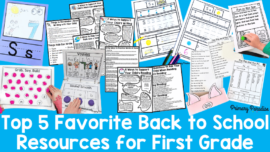The beginning of the school year is exhausting, overwhelming, and so much work. Sometimes it can feel like your class might never find a groove. Will my students ever remember he procedures? Will I ever turn in attendance in on time? (Probably no.) Will things start to slow down at some point? Will teaching ever get easier? Here are 5 important things to remember at the beginning of the school year.
It’s a marathon, not a sprint.
At the beginning of the year, it’s important to remember to pace yourself. Every lesson doesn’t need to be fancy and elaborate. Of course, we want to engage our students, and it’s great to have some really fun, engaging lessons, but you can plan lessons that are engaging without taking hours to prepare. If you start at a sprint, as in working non-stop, you’ll run out of steam by winter break. Instead, pace yourself, and focus on what’s most important. (Which is our next point.)
Focus on procedures and relationships first.
If you want to have a smooth school year, focusing on setting up and practicing solid procedures is super important. Equally important is taking the time to build relationships with your students. So, although you might feel pressure to jump right into content, it’s always wise to take time to model, practice, and tweak procedures.
At the same time, you can start getting to know your students. You can do this by taking a little time each day to chat about the things that interest your students. What activities and hobbies do they do outside of school? Which games do they play? What books do they read? What are they an expert in? Because they’re all an expert in something.
If you can take the time to really iron out your classroom procedures and show your students you care, the rest of the year will be much smoother.
Don’t burn yourself out in the beginning of the year
There are seasons of teaching when you’ll have to work more than “regular” times, and the beginning of the year is one of them. While you’ll likely need to put in a few more hours a week at school, it’s important to take some for yourself as much as possible. If you don’t, you’ll be burnt out before you know it. That’s not good for you, your family, or your students. Set some boundaries and stick to them as much as possible. Allow yourself to say you’ll take Saturday off from all school work, or set a few days a week you leave right on time. Veteran teachers will tell you, there will always be more work, so pace yourself.
It’s an adjustment period, so don’t be afraid to adjust.
As the school year is kicking off, you’re adjusting to new students. Your new students are adjusting to a new teacher, grade, and classroom. Adjustment periods are hard, but they’re also a great opportunity to adjust. The beginning of the year is the easiest time to change things up if they’re not working, because it’s all so new. Don’t change all the things every day, but if something isn’t working, make an adjustment. If the carefully thought out morning routine is not going smoothly? Change it. If your really cool seating arrangement is causing issues? Try something new. Don’t be afraid to make changes at the beginning of the year.
Every day is a new chance at the beginning of the school year.
Although this is true all year long, it’s especially helpful to remember at the beginning of the school year. Each day is a new change for you and for your students. If yesterday was terrible? Good news. Today is a new day. This is great to remember yourself and remind your students. You have 180 days to try again, and so does your class. Make the most of each day by starting with a clean slate. If they can forgive your math lesson that totally bombed, you can forgive their extra talking or incomplete work from yesterday.
Want to keep reading? Here are some articles you’re sure to love:
- Why Teachers Need to be “Out of Control”
- 3 Ways to Build Confidence in Your Developing Writers
- Free At Home Parent’s Guide for Supporting Student Writing




